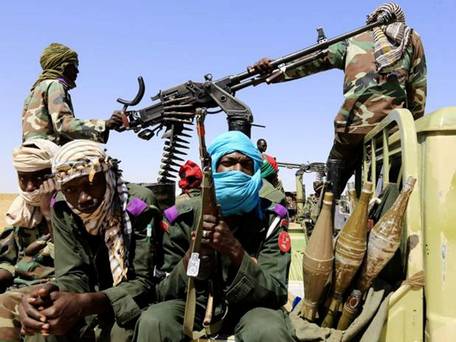
Over 200 women and girls in Darfur were raped over three days in a “widespread, organised and systematic” attack by Sudanese government forces.
Khatera – who is in her 40s – and her three daughters were among the 221 women raped by Sudan Armed Forces (SAF) soldiers.
Two of her daughters were under 11 years old at the time of the attack.
“Eighteen soldiers came into our house. Three took the men out. They beat the men with the back of their guns. Then they dragged [the men] out of the house,” Nadia, in her twenties, said.
“Then the 15 [remaining soldiers] raped us, all four of us. They beat us and they did whatever they wanted.”
Based on the systematic testimonies of 15 survivors, and an additional 21 credible witnesses, the HRW report details how soldiers burst into homes, accused the residents of harbouring either a member of the rebel forces or of killing a missing solider, and then beat the man before they raped the women of the family.
“Two soldiers separately said they were given direct orders to attack and specifically to rape, on the pretext of the missing soldier,” Jonathan Loeb, author of the HRW report.
On two of the nights hundreds of the town’s men were forcibly marched by soldiers and then beaten on the outskirts of Tabit, leaving women particularly vulnerable as the soldiers moved in.
Umm-Jumma, in her thirties, heard screaming and ran to her mother’s compound intending to resist.
“When they saw that I wanted to fight they threatened me with their gun. Then they raped me. There were four of them. Two had civilian clothes. [They raped me] in front of my mother. She was screaming,” she said.
News of the attack was first broken by Netherlands-based radio station Radio Dabanga and immediately denied by Sudanese authorities, who accused the station of “spreading lies”.
Access to the town, in the west of Sudan in a region still recovering from decades of civil war, was closed down and although one investigation was let in on 9 November, campaigners insist it is unreliable.
“Victims were threatened and investigators were not allowed to interview them without the presence of officials,” said Mr Loeb.
“It was completely compromised and we need access to the site so that a proper investigation can be carried out.”
Subsequently international investigators have been repeatedly denied access by the Sudanese government.
Independent News Service
FRENCH VERSION
“Ils l’ont fait un par un. On a aidé beat et l’autre violée. Alorsqu’ils iraient à la prochaine fille,”survivant yeboue revendiquéedans le rapport de Human Rights Watch de 48 pages détaillantles atrocités de Tabit, une ville de 7 000 dans la région de Darfourdu Soudan en octobre dernier.
Yeboue – qui est dans son 40 s – et ses trois filles ont été parmiles 221 femmes violées par des soldats des Forces armées duSoudan (FAS).
Deux de ses filles avaient moins de 11 ans au moment del’attaque.
“Dix-huit soldats sont venus dans notre maison. Trois ont pris leshommes. Ils ont battu les hommes avec le dos de leurs fusils. Puisils ont tiré [les hommes] hors de la maison, “Nadia, dans lavingtaine, dit.
« Puis le 15 [restants soldats] violée nous, tous les quatre. Ils nousont battus et ils ont fait tout ce qu’ils voulaient.”
Basé sur les témoignages systématiques de 15 survivants, et unsupplémentaire 21 des témoins crédibles, les détails de rapportde Human Rights Watch comment les soldats irruption dans lesmaisons, accusé les résidents d’héberger soit un membre desforces rebelles ou d’avoir tué un soldat manquant et ensuitebattre l’homme avant, ils ont violé les femmes de la famille.
« Deux soldats séparément dit qu’ils ont reçu l’ordre directd’attaque et plus précisément au viol, sous le prétexte du soldatdisparu, » Jonathan Loeb, auteur du rapport de HRW.
Sur deux des nuits des centaines d’hommes de la ville ont été ont défilé par la force par les soldats et puis battus à la périphérie deTabit, laissant les femmes particulièrement vulnérables commeles soldats s’installe en.
um-Jumma, dans la trentaine, a entendu crier et a couru vers samère composé qui a l’intention de résister.
“Quand ils ont vu que j’ai voulu combattre ils m’ont menacé deleurs armes à feu. Puis ils m’a violée. Il y avait quatre d’entre eux.Deux avaient des vêtements civils. [Ils m’a violée] en face de mamère. Elle hurlait, » dit-elle.
Nouvelle de l’attaque était brisé tout d’abord par la station deradio néerlandaise Radio Dabanga et immédiatement démentipar les autorités soudanaises, qui ont accusé la station de « propagation de mensonges ».
Accès à la ville, dans l’ouest du Soudan, dans une région encoreconvalescent après des décennies de guerre civile, a été fermé, etmême si une enquête a été laissée le 9 novembre, les militantsinsistent qu’il n’est pas fiable.
“Victimes ont été menacés et les enquêteurs n’étaient pasautorisés à les interroger sans la présence de fonctionnaires, adéclaré M. Loeb.
« Il était complètement compromise et nous avons besoin del’accès au site pour qu’une enquête appropriée peut êtreeffectuée. »
Par la suite les enquêteurs internationaux ont été à plusieurs reprises refusés l’accès par le gouvernement soudanais.
Service d’information indépendant


